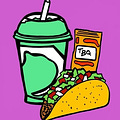Running a literary magazine is not the thing I thought would finally make me feel like a writer. I barely knew what a literary magazine was. I didn’t know what a literary writer was anymore, or why I still wanted to call myself one. My writing credits felt like a terminal illness. I was trying to remain upbeat. They included a byline on a defunct blog called Monkey Goggles and a first-place short story in an also defunct local paper where the editor mentioned they had received even less entries than the year before.
How does anyone become a writer? When do you begin to feel like one? More importantly, how do you get an agent and six figures and the validation that ends the dull ache of it all? I hoped to learn the answers to these questions in grad school, studying fiction in a non-MFA program. It left me understanding less. I wrote anyway. I blogged. I sent things to places I never heard of and never heard back from either. I wrote “maybe essays” in word files. Sometimes I combined them into one large file to see if it felt like something. I queried agents to no replies. I sent things to the New Yorker in case it was some lottery where all you need to do is throw in on a ticket and be lucky.
I blame my childhood. I didn’t talk. My parents called it shyness because it was the 1980s, and there were no other words for the lack of eye contact and selective mutism. Maybe there’s a beautiful genre-defying memoir where my search for words leads me to becoming a writer. It’s probably just a crappy story where instead of getting therapy and classroom supports, I was given the words “gifted” and “talented.”
Teachers encouraged me with intensity of the self-esteem movement, pumping me up until I felt like an inflatable in a used car lot distorting helplessly against gravity. I’m also trans and nonbinary. I had no words for this, either. But like other weird, nervous, queer kids, I found my way to libraries and books. I knew I wanted to be one of the writers.
Except I wasn’t very good at it. I still worked at my “temporary while I found my way into writing” office job. It was just my actual job now. I threw myself into other interests, as if my deepest longing was just another hobby, like record collecting and craft beers. A Facebook acquaintance announced she sold her short story collection to Graywolf, a dream publisher. I unfriended. It wasn’t personal. Giving up looks more like a grieving process than a conscious decision.
Then my mother died. She had been the biggest champion of my writing. She didn’t get to see the latest accomplishment, an article in another defunct magazine that would not survive beyond the second issue. She had funded enough of the first issue to recieve several copies, I found out, as my dad handed me the magazines, each one mint, glossy, and unbearable.
I quit. Sometimes quitting is the greatest act of self-care. It’s also just part of the writing life. I tried on other identities. Some fit me, like becoming a parent. Others, less so. I tried jogging. I made an influencer Instagram account for my dog. I daydreamed about becoming a Disney Adult. Collecting popcorn buckets just seemed more fun than creative writing.
The dull ache called me back. Sure, I was probably joking when I put out a call for submissions asking writers to send their best work defining a new genre of Taco Bell literature. What did that even mean? Nearly 70 writers and poets and artists took a shot at it anyway, submitting fiction, poems, prose, and art. The confidence inspired me. Many admitted in their cover notes they weren’t sure if this was real. I wasn’t either. My experience with editing was pressing “Ctrl+A” and “Backspace” to restore the proper equilibrium of blankness in Word docs.
Still, there was one thing I had learned deep in the trenches, one thing I did know how to do with absolute certainty. I compiled all the pieces received into one large document to see if it felt like something. And it did. It felt like a literary magazine. Editor in Chief, Taco Bell Quarterly. It was a literary accomplishment.
Writer is not a title bestowed upon you. It’s not something you have to earn. You’re a writer and you can just use this word. Writer. Poet. Artist. Novelist. Stumblefucker. It’s like an accessory, a bow you can wear in your hair. Or go ahead and pin it directly to your chest like the man you were born to be. You can do whatever you want.
Writing is a conversation, not a set of rules. You are a writer when you participate in the ongoing conversation. We invite you to join the literary conversation and submit to literary magazines and to re-create this literary world in a way that makes us feel less like failures and burn-outs and feel more like the writers and artists we were born to be. Try the word on. This is how you become a writer.
-
Sign up for TBQ on Substack for more literary dread, dreams, magazine updates, and community. It will always be free. We only sell Taco Bell. Nacho fries are probably back and we will keep you updated.



The beginning of something grande.
Relating to this a lot more than I would like to. Wishing you the very best with this delightful new venture.